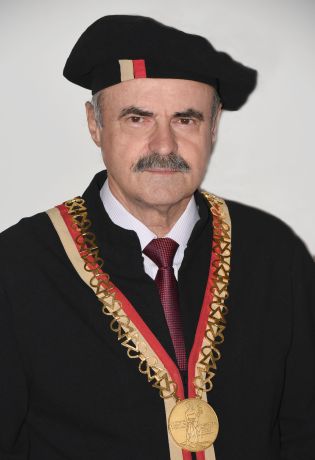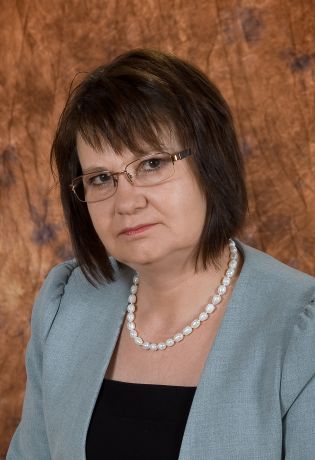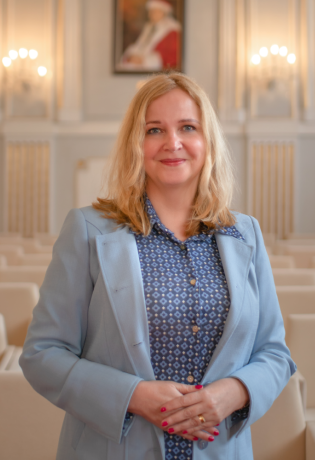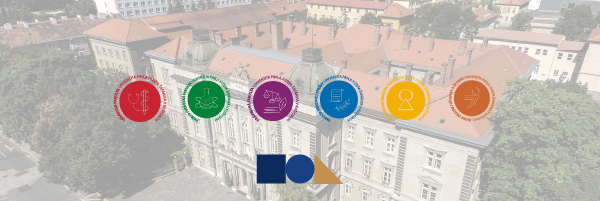The history of the establishment of the Faculty of Arts in Košice dates back to the middle of the 17th century. On 12 February 1657, Bishop Benedikt Kisdy from Eger issued the Founding Charter of Universitas Cassoviensis at his seat in Jasov. The university was confirmed by the Golden Bull of Emperor Leopold I on 7 August 1660 in Graz, who acknowledged all the privileges and rights of a faculty, thus placing it on a par with the universities in Vienna, Prague, Olomouc, Graz and Trnava. The structure of the university corresponded to that of the other European universities that were under the management of the Jesuits. One of its two faculties, along with the Faculty of Theology, was the Faculty of Arts, where studies were three years long. Various subjects in classical philology, history, and literature were lectured there by renowned pedagogues, such as Martin Palkovič, Samuel Timon, Štefan Karpinai, Karol Wagner, Juraj Sklenár, Andrej Bernolák, and some others.
In 1773, the Jesuit Order was cancelled. The university became a state-run branch of the only Hungarian university in Buda. Its name was changed to Academia Regia. The Faculty of Arts became its part, however, after the adoption of the educational reform Ratio Educationis in 1776, teaching took on a more secular character and in 1850, the Royal Academy was transformed into the Academy of Law, thusinterrupting university studies in the humanities in Košice for a long period of time.
It was not until 1959 that the humanities were indirectly resumed, when the Faculty of Medicine of Comenius University in Bratislava and the Faculty of Arts, formed from the Faculty of Philology of the Pedagogical University in Prešov, merged to Pavol Jozef Šafárik University in Košice.
The social and political developments of the 1990s affected the direction of Pavol Jozef Šafárik University in Košice. By virtue of Act No. 361/1996 Coll. on the split of Pavol Jozef Šafárik University in Košice, the university was split into two separate legal entities, with the effect from 1 January 1997: Pavol Jozef Šafárik University in Košice and University of Prešov in Prešov. With this political act, Košice also lost indirect contact with higher education in the humanities. It only was a question of time for higher education in humanities in the second largest economic, social, cultural, educational, artistic, philosophical-spiritual and mass media-communication centre of Slovakia to be restored and for the emergence of a strong humanitarian source of cultivating the quality of spiritual life and a natural counter-balancing corrective to the orientation in Košice toward technology, medicine, and natural sciences in academic life.
Pavol Jozef Šafárik University management chaired by its Rector, prof. h. c. prof. JUDr. Vladimír Babčák, CSc. and the Vice-rector for development of Pavol Jozef Šafárik University, doc. RNDr. Ján Sabo, CSc., made a decisive step toward establishing a faculty of humanities in Košice. On 9 June 2006, they presented to the Scientific Board a document entitled Amendment to Long-term Prospects of Pavol Jozef Šafárik University in Košice for the Years 2004 to 2010. The above document contained an unambiguous intention of the university management to set up a faculty of arts at Pavol Jozef Šafárik University.
The Faculty of Arts of Pavol Jozef Šafárik University in Košice was preceded by the Institute of Philological and Social Scholarship at Pavol Jozef Šafárik University in Košice, which was established as a research and educational institution with university-wide competence under Pavol Jozef Šafárik University Rector’s Decree No. 13/2005 on 1 June 2005. Doc. PhDr. František Šimon, CSc. was commissioned the director of the Institute. On 1 March 2006, prof. PhDr. Vladimír Leško, CSc. was appointed the Institute Director by the Rector of Pavol Jozef Šafárik University. The management of the Institute was further formed by its deputies – prof. PhDr. Ladislav Lováš, CSc., and doc. PhDr. Oľga Orosová, CSc. The organisational structure of the Institute consisted initially of five departments; their number grew to eight as of
1 September 2006: Department of English and American Studies, Department of Non-Slavonic Languages, Department of Slovak Studies, Slavic Philologies and Communication, Department of Psychology, Department of Economy and Human Resource Management, Department of Philosophy and History of Philosophy, Department of Educational Psychology and Psychology of Health, and Department of Education. As of 1 September 2006, 38 study programmes were accredited, including 4 bachelor study programmes of single major study with the possibility of continuing in master study programmes, 15 bachelor study programmes of interdisciplinary study with the possibility of continuing in master study programmes, 3 master study programmes of single major study, 14 master teaching-oriented study programmes, and 2 PhD study programmes (Social Psychology and Psychology of Work, History of Philosophy). In 2006, three study programmes were submitted for accreditation: British and American Studies (PhD degree), English Language for European Institutions and Economics (bachelor’s degree) and German Language and Literature – Slovak Language and Literature (bachelor’s degree).
The Institute of Philological and Social Scholarship at Pavol Jozef Šafárik University cooperated with the Faculty of Science of Pavol Jozef Šafárik University in the implementation of the interdisciplinary study programmes of science subjects, psychology, and philosophy. In the academic year 2006/2007, 511 students were enrolled in the bachelor’s degree study, out of which 287 students were enrolled in the first two years of single major study programmes and 224 students started studying in the first year of interdisciplinary study programmes. At the end of 2006, the Institute had 4 internal and 7 external PhD students. The staff of the Institute developed cooperation with universities in the Netherlands, the Czech Republic, and France (long-year close cooperation with the University of Groningen, the Netherlands, in the implementation of bilateral research projects, with the University of West Bohemia in Pilsen in the implementation of SOCRATES contract, with the Marc Bloch University in Strasbourg, which is the coordinator of the National Programme of Teaching Translation and Interpreting at Universities in the Slovak Republic in Postgraduate Form, implemented under the auspices of the Council of Europe). They were also actively engaged in international organisations such as EUPHA (European Public Health Association), UNIPREV (United Prevention Association), ESSE (European Society for the Study of English), International Society for Engineering Education and the International Commission on Phonetics and Phonology of the International Committee of Slavists, and were also members of research teams of 15 international projects. At the end of 2006, the Institute’s research potential consisted of 8 professors, 4 associate professors, 8 assistant professors, 25 senior assistants, 7 assistants, 2 lecturers, 11 researchers, 4 internal PhD students and 6 external PhD students.
Between March and August 2006, the management of the Institute together with the heads of the departments prepared the documentation required for the accreditation of the new faculty. In September 2006, the Rector’s Advisory Board gave their opinion on the documentation submitted and approved the same with the recommendations. After amendments, the Rector of Pavol Jozef Šafárik University submitted the completed documentation to the Accreditation Commission of the Slovak Republic. The dynamics of the consideration of the Application for the Establishment of the Faculty of Arts of Pavol Jozef Šafárik University was extremely favourable. On 13 December 2006, the Accreditation Commission of the Government of the Slovak Republic gave their positive statement on the establishment of the Faculty of Arts of Pavol Jozef Šafárik University. On 14 December 2006, the Rector of Pavol Jozef Šafárik University presented the motion to the Academic Senate for approving the establishment of the Faculty of Arts of Pavol Jozef Šafárik University. The Academic Senate approved the establishment of the new faculty by a majority of votes. The Rector of Pavol Jozef Šafárik University prof. h. c. prof. JUDr. Vladimír Babčák, CSc. established the Faculty of Arts by the Founding Charter as of 1 January 2007. Pursuant to Section 22 (5) of Act No. 131/2002 Coll. on Higher Education and on amendments of and supplements to certain acts as amended, prof. PhDr. Ján Gbúr, CSc. was appointed the dean of the newly set up faculty, with the effect from 1 January 2007.
After ten years since the split of Pavol Jozef Šafárik University in Košice into Pavol Jozef Šafárik University in Košice and Prešov University in Prešov, the Faculty of Arts reappeared in the composition of the faculties of the University. After almost three centuries since the time of Universitas Cassoviensis, humanities and social sciences education has been restored in the history of the city of Košice. Pavol Jozef Šafárik University in Košice has thus stabilised its structure into a fully functioning model and has become an acceptable alternative to Comenius University in Bratislava for the eastern part of the territory of Slovakia.
Deans of the Faculty of Arts

2007 – 2015

2015 – 2023

2023 – present




